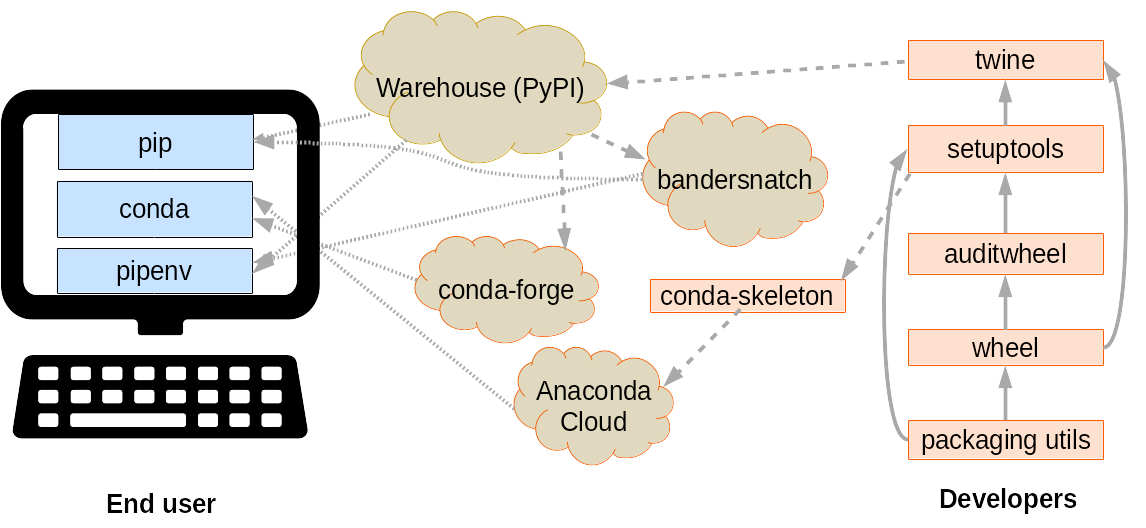# 01 Jul 2021, 12:58PM: Software Bill of Materials & the US Federal Government:
In February, the United States's President Biden signed an executive order on the US's supply chains; he followed this up with an EO in May specifically concentrating on improving cybersecurity. To quote Tidelift's summary, "in essence, this order is a striking attempt to create a new global standard for cybersecurity that all organizations around the world will need to ensure their software supply chain meets or exceeds in the near future."
Because of the EO, the US's National Telecommunications and Information Administration requested comment "on the minimum elements for a Software Bill of Materials (SBOM), and what other factors should be considered in the request, production, distribution, and consumption of SBOMs". I heard about this thanks to Jacob Kaplan-Moss, who suggested the Python Software Foundation could share its open source perspective. So I led an effort to submit a comment on behalf of the Packaging Working Group of the PSF - thanks to Morgan Mayo (PSF Director of Resource Development) for some of the prose!
The Packaging WG comment, along with comments from 80+ other individuals and groups, are now up at the NTIA website. Check out Section II ("Background context about the Python packaging toolchain and ecosystem") for a simplified yet still confusing diagram. Section IV of our comment ("Infrastructure funding") is pretty short; for a longer treatment on a related topic, see Tidelift's comment "Software bills of materials are important—but they won't work at scale if we don't pay the maintainers".
# 03 Jul 2021, 05:32PM: Some Novel Python Packaging/Distribution/Inspection/Installation Projects:
People who program in Python have an easier time hearing about package-related tools that have been around for a while and that are under the banner of the Python Packaging Authority, or that are commercially supported (this simplified diagram showcases a lot of them). And if you're looking for canonical guidance on what tools to use, check out packaging.python.org and tell your colleagues.
But -- since open source and open standards make things interoperable -- people also develop new tools for their specific needs in packaging, distribution, inspection, and installation, and sometimes I come across them when people announce them. I haven't tried any of these yet but here's a list of some stuff I noticed from the last few years.
Pypitoken, "A library for generating and manipulating PyPI tokens"
Thoth, "an enhanced server-side resolution offered to the Python community" (related: thoth-solver: "A tool for aggregating Python package metadata" and Dependency Monkey which "can compute all the possible combinations of packages that can occur in a resolved software stack and verify the given stack works well")
installer, "a low-level library for installing wheel distributions"
Dotlock "is a package management tool similar to pipenv, but with a different philosophy: instead of acting as a wrapper around pip, dotlock handles package resolution natively."
simpleindex provides "a lightweight PEP-503 private index/proxy" that declares routing rules to serve files from local directories. Also see pywharf.
Mach-nix "allows one to package Python projects and environments with Nix, requiring minimal knowledge of Nix.... Why would you want to use this tool? Reproducible builds with all build and run-time dependencies provided by the same package manager, regardless of whether they're Python dependencies or not."
ipwhl: a downstream repository in which "Each repo release will ensure a single version for a project for each platform, and one can use it to replace PyPI for both build and runtime dependencies for reproducibility." Per the repo for "interplanetary wheels (or floating cheeses)": "platform-unique, singly-versioned Python binary distributions backed by IPFS for security and reproducibility."
Python devirtualizer: "a preliminary implementation which manages
shared packages so that only one copy of each package version is
required."
pip-deepfreeze: "a small tool that aims at managing the dependencies of a Python application in a virtual environment."
And one more thing that is a PyPA project: the Python Advisory DB. After public discussion, there's a new community-owned repository of security advisories for packages published on https://pypi.org.

